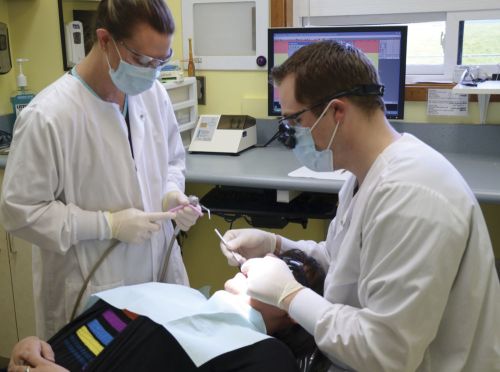Sequestration squeeze
Published 11:21 am Friday, May 3, 2013

- <p>Dentistry is one of the services offered at the Yellowhawk Tribal Health Center.</p>
Sequestration is squeezing Indian country and some argue that the 5 percent, across-the-board cuts violate treaty rights.
Many, such as Tim Gilbert, chief executive officer of the Yellowhawk Tribal Health Center in Mission, believe the federal government should honor treaties promising to provide health and education services to tribes.
Just look at the Treaty of 1855 with Walla Walla, Cayuse and Umatilla tribes, Gilbert said. Local tribes gave up 6.4 million acres in exchange for various rights, one being healthcare services.
The treaty represents a federal trust responsibility, he said. Tribal members feel like if you reduce us, you are breaking the Treaty of 1855.
Gilbert, a native Alaskan and not a member of the CTUIR, said many Americans mistakenly believe tribes receive free health care.
Our message is that it is not free at all, he said. It was pre-paid with a whole bunch of land.
Indian Health Services, a federal agency within the United States Department of the Interior, provides basic health care for two million American Indians and Alaskans Natives.
A few days after the nation fell off the fiscal cliff, Health & Human Services Secretary Kathleen Sebelius spoke at the National Congress of American Indians.
In the immediate future, we face the challenge of dealing with the harsh, arbitrary budget cuts Congress allowed to go into effect with sequestration, she said. I share your concerns about what these cuts would mean for indian country. They could mean 3,000 fewer inpatient admissions and 804,000 fewer outpatient visits for IHS patients.
Gilbert provided some dollar amounts.
Sequestration affects the Indian Health Service to the tune of $228 million for indian country as a whole, Gilbert said. Yellowhawks little piece of the pie is about $350,000.
He said uncertainty about the fiscal cliff led Yellowhawk to budget conservatively.
Were going to be able to absorb some of that, he said. We must make up for $168,000 the rest we have built into our budget.
Gilbert said tribes throughout the U.S. had hoped the Indian Health Service would advocate on their behalf to make them exempt from the effects of sequestration, or at least minimize the effect to 2 percent.
There were some assumptions that Congress would make certain exemptions effective, Gilbert said. Long story short, they didnt.
Gilbert doesnt know if any tribal lawyers in the nation are sharpening their pencils for a legal battle. Hes simply focusing on getting Yellowhawk through the next year.
Gilbert said the health center does not receive money from the reservations booming Wildhorse Resort & Casino, except for a small amount resulting from alcohol sales.
The clinic gets about $1.75 million by billing third-party insurance and other funding from various small state and federal grants, but the bulk comes through the Indian Health Service. That amount about $7 million before sequestration stays relatively flat, Gilbert said.
Meanwhile, the cost of providing healthcare continues going up, he said, moving his right hand in a 45-degree trajectory to the sky.
Yellowhawk has about 3,500 active users about 2,900 CTUIR members and the rest registered with other federally recognized tribes. As with most other reservations, tribal members face more poverty and health challenges than the general population. In 2011, the poverty rate for all reservation American Indians and Alaska Natives hovered at 40 percent.
The clinic has hired an outreach worker who will work to locate and help eligible patients to sign up for Medicaid and the Oregon Health Plan.
While many tribal hospitals and health centers must furlough employees, freeze hiring and cut programs, Gilbert said Yellowhawk intends to keep services in place and make up the difference with more aggressive third-party billing.
He hopes the drop in funding wont go beyond this year.
You can only absorb getting less money for so long, he said. Then you have to do something drastic.
Contact Kathy Aney at kaney@eastoregonian.com or 541-966-0810.








